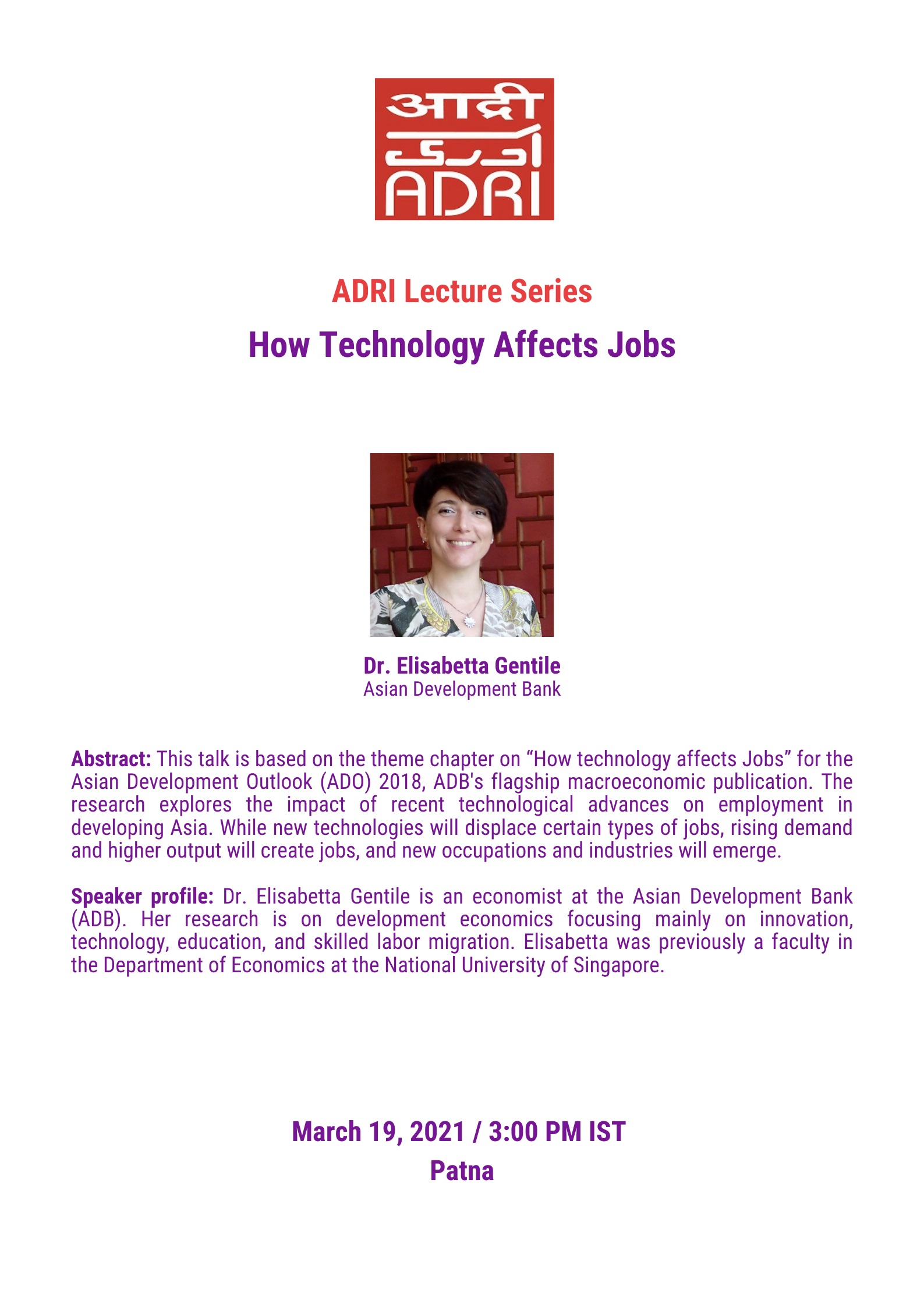Events of ADRI Patna

Speaker : Dr. Elisabetta Gentile, Asian Development Bank
Title: How technology affects Jobs
Speaker: Dr. Elisabetta Gentile, Asian Development Bank
Date and Time: 19th March 2021 at 15.00 (IST)
Zoom Link Meeting: Meeting Registration - Zoom
Meeting ID: 895 9905 5669
Passcode: adri1991
Abstract: This talk is based on the theme chapter on “How technology affects Jobs” for the Asian Development Outlook (ADO) 2018, ADB's flagship macroeconomic publication. The research explores the impact of recent technological advances on employment in developing Asia. While new technologies will displace certain types of jobs, rising demand and higher output will create jobs, and new occupations and industries will emerge.
Speaker profile: Dr. Elisabetta Gentile is an economist at the Asian Development Bank (ADB). Her research is on development economics focusing mainly on innovation, technology, education, and skilled labor migration. Elisabetta was previously a faculty in the Department of Economics at the National University of Singapore.
Patna, March 19. The Asian Development Research Institute (ADRI) organised an online lecture titled “How Technology Affects Jobs” on 19th March 2021, delivered by Elisabetta Gentile of Asian Development Bank (ADB). The Lecture was moderated by Ashmita Gupta (ADRI) and event panellists were Shri Sanjay Kumar, Additional Chief Secretary (Education), Government of Bihar, Shri Dipak Kumar Singh, Principal Secretary (Environment), Government of Bihar and Smt Harjot Kaur Bamhrah, Managing Director (Women Development Corporation).
Elisabetta Genetile said that developing Asia has created 30 million jobs annually in industry and services over the past 25 years. Job creation has been accompanied by improved productivity, rising earnings for workers, and large reductions in poverty. The jobs challenge is far from over. From 2015 to 2030, the labour force in developing Asia is projected to increase by about 11 million per year. However, concern is growing that some elements of this framework will no longer improve labour market outcomes for many workers. Paradoxically, the concern stems from the fundamental driver of human progress throughout history: technological change.
Elisabetta also stated that technology creates new occupations, new industries. Technological advances have caused a decrease in routine occupations. However, it is simplistic at best to say that “technology is displacing jobs:” Productivity gains and strong consumer demand in developing Asia are creating many more jobs than are being directly displaced by technology. But the new jobs created require different skill sets than those displaced: Both government and business have a pivotal role to play in fostering occupational mobility. Employment prospects for workers in routine occupations may not get better after the pandemic ends. Many firms will not revert to their pre pandemic production process; The expanded and continued use of telework may permanently decrease demand for many in person routine occupations. Evidence already shows that the pandemic has had a disproportionately negative effect on women because
they are concentrated in occupations with high physical proximity; they are bearing the burden of unpaid work in the household.
Shree Sanjay Kumar, Additional Chief Secretary, Education Department, Government of Bihar chaired the session and remarked that a paradigm shift was needed as application of technology does not help with a large number of people not having any surety of income. Shree Deepak Kumar Singh, Principal Secretary, Environment Department pointed out that the skill development program framework was unfortunately not keeping pace with the technological changes that were taking place in the industry. Harjot Kaur Bamhrah, Managing Director, Women Development Corporation argued for improving the skill sets of women so that they could get better-paid jobs. They tended to be more in jobs with low skill sets, which were far from technology.
Professor Prabhat P Ghosh, Member Secretary, ADRI brought up the vote of thanks.